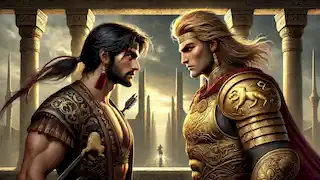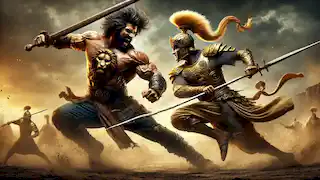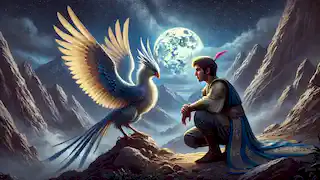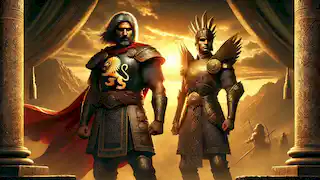"The Tale of Rostam and Esfandiyar" is one of the most epic and tragic stories from the Persian epic poem, the Shahnameh (The Book of Kings), written by the poet Ferdowsi. The tale revolves around two of the greatest heroes of Iranian mythology, Rostam, the invincible champion of Iran, and Esfandiyar, the valiant and noble prince who is destined for greatness but is bound by fate. Their confrontation is not merely a clash of two warriors but a deep exploration of destiny, honor, and the consequences of pride. The story begins with King Goshtasp, the ruler of Iran, who wishes to solidify his kingdom's strength and authority. He has a mighty son, Prince Esfandiyar, a warrior with divine gifts who had proven himself in battle many times. Esfandiyar's body is invulnerable to any weapon due to a divine boon, making him an undefeatable warrior. However, despite his many victories, Esfandiyar still craves the crown promised to him by his father. One day, King Goshtasp calls upon Esfandiyar and tells him, "If you wish to claim the throne, you must first bring Rostam to me in chains." Rostam, the greatest hero of Iran, had always remained independent and refused to bow to any king, a decision that kept him in high regard among the people but in conflict with the throne. Despite his unease, Esfandiyar agrees to his father's demand, believing it to be his duty. He sets out with a vast army towards Zabulistan, where Rostam rules over his land with honor and justice. When Esfandiyar arrives, he sends a message to Rostam: "The king has ordered me to take you in chains, not because of any wrongdoing but to prove your loyalty to the crown. If you submit, I shall guarantee your safety and honor." Rostam, proud and unyielding, replies, "I have never bowed to any man, nor shall I now. If King Goshtasp seeks my loyalty, he will have it through my friendship, not through chains." This sets the stage for the inevitable confrontation between these two mighty warriors. Esfandiyar, disheartened but bound by his duty, approaches Rostam in person. The two men meet, and there is an air of mutual respect between them. Rostam sees in Esfandiyar the greatness that Iran's future needs, while Esfandiyar admires Rostam's wisdom, strength, and integrity. Rostam says, "Why do you seek to do this? We are both servants of Iran, and our blood should not be spilled over a king's command." Esfandiyar responds, "I do this not out of hate but out of duty. My father’s command binds me, and through this, I will earn my right to the throne. My fate is to obey, even if it means fighting a man I respect." Rostam tries to dissuade him further, saying, "Fate is cruel, and kings are often unjust. Your father uses you for his gain. Do not throw your life and honor away in blind obedience." Esfandiyar, resolute, replies, "It is my destiny, and I will fulfill it, even if it means I must fight you." Unable to resolve their conflict through words, they agree to meet in battle the next morning. Rostam returns home, heavy-hearted, knowing he must face a foe who is not only destined to be great but also carries the invulnerability that no weapon can pierce. The sun rises, and both warriors prepare themselves for the inevitable. Rostam dons his armor and mounts his legendary steed, Rakhsh, while Esfandiyar rides forth in his shining chariot, his armor gleaming like the sun. The two armies watch in anticipation, knowing that the clash would echo through the ages. They face each other on the battlefield, and with a mighty roar, the battle begins. Rostam, with his strength and experience, delivers powerful blows that could fell any other warrior, but Esfandiyar withstands them, seemingly unharmed. His invulnerable body deflects Rostam's sword strikes, and it becomes clear that no ordinary weapon can defeat him. Esfandiyar strikes back, his blows precise and relentless, forcing Rostam to retreat. For the first time, the great champion feels the weight of a true challenge, and yet, even in this desperate moment, his mind is racing for a solution. The battle rages on for hours, with neither side yielding. As evening approaches, Rostam realizes that he cannot defeat Esfandiyar through sheer force. Exhausted, they pause the fight, agreeing to resume in the morning. That night, Rostam seeks counsel from his father, Zal, who advises him to visit the mysterious Simurgh, a legendary bird that had once saved Rostam's life as a child. With no other options, Rostam rides to the mountain where the Simurgh resides. The Simurgh listens to Rostam’s plight and reveals a harsh truth: “There is only one way to defeat Esfandiyar, but it is not without great cost. Use the tamarisk bow with the golden arrow. It will pierce his eyes, the only vulnerable part of his body. But be warned, should you do this, the consequences will be dire.” Rostam is torn, for he knows that such an act will forever stain his honor. But he also understands that if he does not act, Esfandiyar will be forced to subjugate him, and Iran will lose a vital protector. The next morning, Rostam returns to the battlefield, determined yet sorrowful. Esfandiyar, seeing the sadness in Rostam’s eyes, asks, "Why do you hesitate, great hero?" Rostam replies, "Because this battle is one that neither of us should fight. But now, I must do what fate demands." With a heavy heart, Rostam takes aim and releases the golden arrow. It flies true and strikes Esfandiyar’s eye, piercing through. The invincible prince falls, and the earth itself seems to groan with the weight of his defeat. Esfandiyar lies on the ground, blood streaming from his eye, yet he looks upon Rostam with a smile. "You have won, great Rostam, but you have also lost. My death will bring sorrow upon you, for it is not the blade that kills me but destiny itself." Rostam, kneeling beside the fallen prince, weeps. "Forgive me, brave Esfandiyar. I did not wish this fate for either of us." Esfandiyar, with his last breath, responds, "You have nothing to be forgiven for. We are both but pawns in a greater game. My father sought my death through you, for he knew my destiny would surpass his own. Let my death serve as a warning, that kings who act out of fear will always lead their people to ruin." With these words, Esfandiyar dies, leaving Rostam to bear the burden of his victory. Rostam carries Esfandiyar’s body back to his family, where the cries of mourning echo through the land. When King Goshtasp hears of his son’s death, he feels no joy in Rostam's defeat. Instead, he weeps for the son he sacrificed for power, realizing too late that he had sent him to his doom. Rostam returns to Zabulistan, his heart heavy with grief. He is hailed as a hero, but the victory tastes of ashes. He knows that he has been forever changed by the death of the noble prince, and he feels the weight of Esfandiyar's words echoing in his mind. {{{_04}}} The tale of Rostam and Esfandiyar is one that lingers in the hearts of all who hear it. It is a story of pride, duty, destiny, and the tragic consequences of human choices. Both heroes remain revered in the annals of history, symbols of strength, honor, and the inevitable suffering that comes with greatness. Rostam lived many more years, fighting for Iran and its people, but he never forgot the face of Esfandiyar. In every battle, he heard the prince’s dying words, reminding him of the cost of pride and the inescapable nature of fate. Esfandiyar, too, lived on in legend, a prince who died not because he was weak, but because he was bound by the chains of destiny. He became a symbol of the tragic hero, one whose greatness was denied by the very forces that sought to shape him. In the end, the story of Rostam and Esfandiyar is not merely a tale of two warriors but a profound reflection on the human condition—the struggles of duty versus desire, the weight of destiny, and the cost of pride and ambition. It stands as a timeless reminder that even the greatest heroes are not immune to the whims of fate and that sometimes, the only victory lies in understanding the true price of power.Part 1: The Summoning of Rostam

Part 2: The Battle of Words and Wills
Part 3: The Battle Begins

Part 4: The Bow of Tamasha

Part 5: The Consequences of Fate
Part 6: The Return to Zabulistan
Part 7: The Aftermath and Legacy
The Tale of Rostam and Esfandiyar
Reading Time: 8 min

About Story: The Tale of Rostam and Esfandiyar is a Legend Stories from iran set in the Ancient Stories. This Dramatic Stories tale explores themes of Courage Stories and is suitable for All Ages Stories. It offers Moral Stories insights. A legendary battle between two heroes destined by fate, exploring the price of pride, duty, and destiny.

















